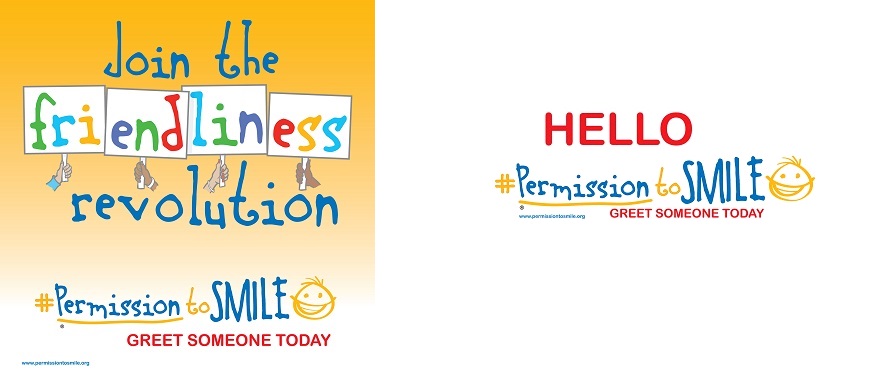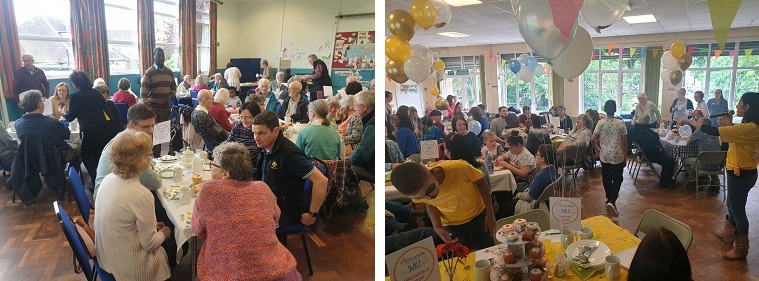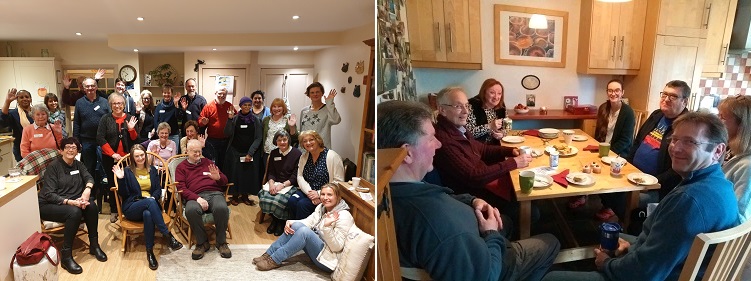A Birmingham-wide campaign, backed by 154 local organisations and with strong city council support, is encouraging friendliness and rekindling community street-by-street, helping to address social isolation and reduce the call on public services.
“I have been greatly impressed with the imagination, hard work and determination of the Permission to Smile campaign team in gathering a huge partnership and in gaining a high profile across the city for this important message. The campaign has been an amazing success” - Cllr Ian Ward, Leader, Birmingham City Council.
The Challenge
Over decades, there was an advancing tide of the public sector doing more and more for people, at the same time as a receding tide of people doing things with and for each other. In recent years, due to enforced austerity, there has been a receding tide of public sector services, leaving a growing gap. The only positive answer is to re-energise people to do things with and for each other. However, there’s an enemy – and it’s called “we keep ourselves to ourselves”.
A number of ‘taboos’ have gradually been developing, causing people to shy away from starting a conversation with someone they don’t yet know, fearful of:
- arousing suspicion (causing others to wonder what they want)
- appearing to be a ‘busybody’;
- invading someone else’s ‘private space’.
While not everyone is restrained (and there are strong local and regional variations), in so many (particularly urban) situations, most people tend to hold back, it having come to feel ‘inappropriate’ to initiate social contact, even on one’s own street. So many older people are prone to say, “When I was young, I knew everybody; now I don’t know anybody”. This has been repeatedly seen in nine years of working with local people to develop ‘Street Associations’, particularly in deprived areas.
How can a socially isolated person hope to get out of their isolation, if it’s seen as ‘inappropriate’ to smile or greet? Similarly, how can real ‘community’ spontaneously develop if people are loath even to smile or greet those who live in the same neighbourhood? Smiling and greeting would be the entry points for the development of anything else, be it communal activity, friendliness, or neighbourly social support for those who need it. Reticence in this area thus causes an increasing burden on social services and the NHS, a loss of the opportunities which real community spirit would provide for social cohesion, for a sense of belonging and the creation of a positive atmosphere, with significant repercussions for mental health.
It is a vital, strategic, need of our time to begin to shift this reticence and encourage an advancing tide of friendliness, smiling greeting – and everything that might flow from an upsurge of community spirit. But how?
What we did
In January 2017, following an approach by Martin Graham of Uturn UK C.I.C. (founders of Street Associations, supported over years by the Esmée Fairbairn Foundation), Birmingham City Council hosted a Cabinet Member Round Table discussion of the idea of a friendliness campaign, which received warm support from a variety of stakeholders. A campaign was subsequently designed by Uturn UK with the help of Birmingham City University’s School of Media, and of a steering group drawn from local organisations. The campaign plans received fulsome support from Birmingham City Council’s corporate leadership team, including mobilising council departments for the display of banners in parks, libraries, council buildings etc.
On 12th May 2018, the ‘Permission to Smile campaign’ was launched by the Lord Mayor in Birmingham’s city centre, the campaign having raised £20,000 through Crowdfunding, half of which came from Birmingham City Council match-funding. The campaign, managed by Uturn UK, had the benefit of energetic support from the Birmingham Civic Society, Birmingham Voluntary Services Council, The Birmingham Mail, the CCG, plus faith groups of all faiths, GP surgeries, schools, businesses, community groups and others – 154 organisations in all. A very high profile was quickly achieved, through 850 two-metre banners (‘Permission to Smile: greet someone today’) much in evidence throughout the city, about a third of them being put up by council staff. An ongoing social media campaign has also been amplifying the message.
A second banner, ‘Join the friendliness revolution’, was added to the campaign, followed by a third one featuring a big ‘HELLO’.
The impact
There is already high degree of awareness, (“I’ve seen them everywhere”), outspoken public support (“What a lovely message; it made me smile all the way home”), strong social media support, and there have been 13,000 hits to the website – www.permissiontosmile.org.
Initial evaluation (much more to come), based on interviews with 158 people at participating school gates, GP surgeries and high streets with a nearby banner, found that 85% confirmed their awareness of the campaign; 58% had noticed others making more effort to be friendly; and 73% said they had personally been encouraged to smile and greet others more; and 94% thought a campaign to boost friendliness to be necessary.
School gate comments recorded include:
"Parents say hello to me and never used to".
"I think the school's got a lot more sociable since the banners went up".
“To be honest, I never used to smile with my eyes, but seeing the banner made me decide to really go for it!”
“When I saw the banner, I thought it’s time someone does something about this. Then another mum said, ‘I’m now trying to learn a name every day’”.
However, the greatest impact is starting to materialise as supportive organisations take up the challenge of making a difference in their own neighbourhood, through hosting Permission to Smile Tea Parties. Put on by faith groups, community centres, GP surgeries etc, these Tea Parties feed off the high profile Permission to Smile ‘message’ – the invitation letter going out using the popular ‘brand’, with the local organisation saying they want to be a catalyst for bringing more friendliness ‘right here’.
Many from the local community respond and, on arrival, find that a table has been designated for their particular street. Sitting with, and getting to know, others from their own street, they hear as a group they how they could start a Street Association – and are generally charmed by the idea. This leads to secondary events on the streets themselves, hosted by one of the participants, and Street Associations are formed as a result, giving the campaign a long-term legacy.
Street Associations then put on events to bring people together like a quiz night, picnic or children’s party, rekindling real community spirit and sparking new friendships. The Tea Party acts as a local catalyst for the ‘thing to do’ (starting a Street Association), in response to the Permission to Smile message.
Where to now?
The campaign is ready to help a small number of towns or cities to mount their own campaigns in 2020, including the rights to use the registered names and logos, the provision of all promotional materials, a local page on a regionalised website plus social networking access, plus detailed instructions, with mentoring, to make the most of what has been learnt in Birmingham. There is also a six-minute video on the Birmingham campaign online.
Contact
Martin Graham - Permission to Smile campaign
PO Box 16995, Birmingham B2 2FE
[email protected]
0121 440 8600 / 07931 282716.



